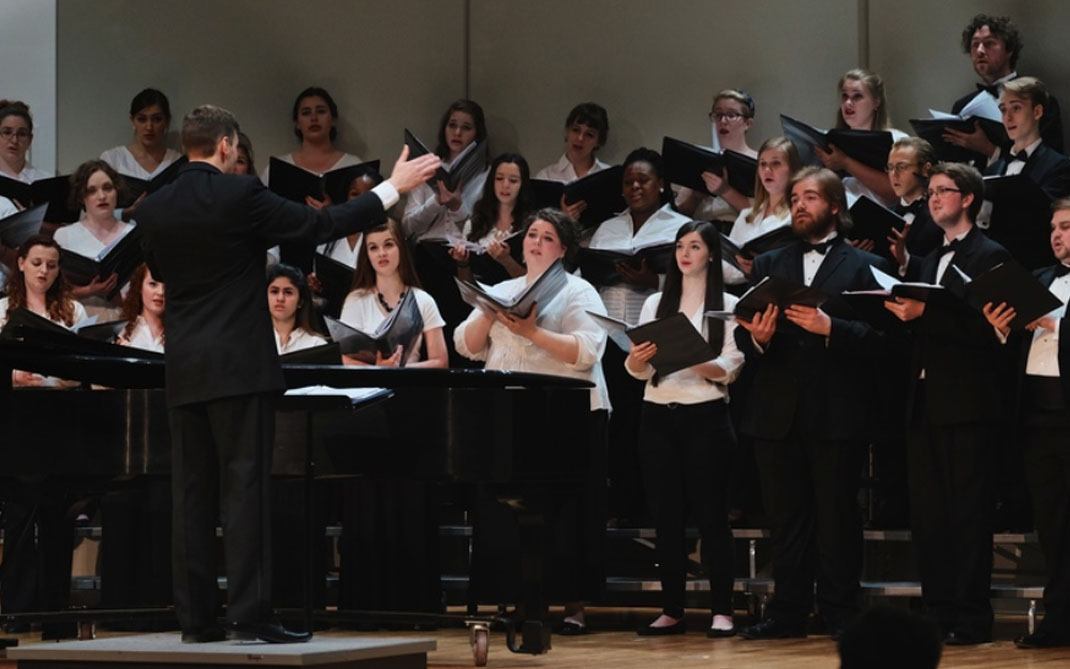Flexible Work and Telework Arrangement Regulation 630
| Regulation 630 | Approved: January 11, 2016 |
| UNIVERSITY OF NORTH CAROLINA SCHOOL OF THE ARTS Flexible Work and Telework Arrangement Regulation Regulation 630 |
|
| Source of Authority: |
North Carolina Office of State Human Resources; |
| Revision Authority: | Chancellor |
| History: | First Issued: January 13, 2016 |
| Related Policies and Regulations: |
Adverse Weather Regulation 101 |
| Responsible Offices: | Human Resources Department |
| Effective Date: | January 11, 2016 |
I. Regulation
UNCSA recognizes that some of its employees may seek ways to achieve better work/life balance, reduce commuting costs or address other issues that affect their ability to work onsite at University facilities or to work traditional work schedules. As such, University managers have the ability to utilize flexible work arrangements, when appropriate, to meet departmental needs while at the same time providing enhanced flexibility to employees.
Departments are strongly encouraged to be open to allowing for alternative work arrangements with the understanding that this flexibility must be accompanied by appropriate employee accountability measures and be compatible with the operational and staffing needs of the work unit. Managers are expected to make sound judgments that balance the needs of the individual employee with the needs of the department and to grant flexible work arrangements equitably for similarly situated individuals within a particular work unit. Specifically, managers and employees alike must be mindful of the special accountabilities that apply to the University as a public employer and the added scrutiny of flexible work arrangements that may be extended to State employees. Additionally, not every UNCSA position lends itself to flexible work arrangements, nor may every proposed arrangement be accommodated. Each arrangement must first be approved by the Human Resources Director.
Beyond the benefits afforded to individual employees, additional policy considerations include balancing workplace flexibility against the needs, interests, and mission of the University, ensuring that the University can remain competitive relative to other employers, and providing managers with an important tool to meet environmental and budgetary challenges.
II. Procedures
A. Flexible Work Arrangements
This regulation sets out three types of flexible work arrangements available at UNCSA: (1) temporary changes in work hours; (2) flexible work schedules; and, (3) flexible work locations (“teleworking” or “telework”). Below is a description of the expectations and obligations associated with each one of these flexible work arrangements.
1. Temporary Change in Work Hours
Employees may request and managers may grant a change in an employee’s regular work schedule that is not permanent or ongoing in order to adjust for an unplanned short-notice or sporadic event. This change may include modifying normal work start and end times or allowing work missed on one day to be made up on another. The flexibility helps the employee to avoid taking leave or other paid time off that would otherwise have to be accounted for in a given week. Managers have the discretion with Human Resources approval, to grant temporary changes in work hours as long as the operational needs of the department are satisfied and to discontinue such arrangements when deemed necessary.
2. Flexible Work Schedules
Flexible work schedules are adjustments to the employee’s reporting or departure times on a regular or recurring basis to respond to the work/life needs of an employee. The revised schedule must continue to support the operational needs of the University and allow for appropriate oversight of the employee’s work assignments. Managers are advised to ensure that adequate supervision is provided for situations in which adjusted work schedules fall outside of core operating hours. Managers may revise or revoke flexible work schedules at any time; however, managers should provide reasonable advance notice to the employee of such revision or revocation, to permit the employee to make alternate arrangements. Ten (10) business days of notice is generally considered appropriate, unless employee conduct or safety issues necessitate a shorter notice period, at the discretion of management.
3. Flexible Work Locations (“Teleworking” or “Telework”)
Teleworking represents an adjustment to the employee’s customary worksite, either on a short-term or on an ongoing or recurring basis, made to respond to the work/life needs of an employee while also considering the operational and staffing needs of the department or unit. A telework situation is voluntary for the employee and at the sole discretion of management and/or the employee’s supervisor. An employee is not entitled to a telework arrangement; it is management’s prerogative to establish a telework arrangement.
The University Human Resources Department makes the sole determination of which positions or employees are eligible for teleworking. SHRA and EHRA Non-Faculty full-time or part-time (half-time or more), permanent, probationary, or time-limited employees are eligible for consideration for teleworking arrangements. As a general rule, temporary, intermittent or part-time (less than half-time) employees are not eligible for teleworking arrangements (see Section 3 of the State Personnel Manual). Some positions have job responsibilities or unique functions that do not lend themselves to teleworking (e.g., front desk receptionist, building and grounds maintenance staff, service oriented staff, and supervisory staff).
Work activities by those employees who are not subject to the overtime provisions of the Fair Labor Standards Act (FLSA) and who choose to accomplish part of their job duties outside of their normal work hours, such as, but not limited to, checking email, reading work-related documents, and returning calls, are not covered by this regulation.
Typically, telework arrangements involve the employee regularly or primarily working from home and are sometimes referred to as “virtual” work arrangements. The teleworking arrangement must continue to support the operational needs of the work unit and also provide for appropriate oversight of the employee’s work. Managers may revise or revoke a flexible work location arrangement at any time; however, managers are expected to provide reasonable advance notice to the employee of such revision or revocation, to permit the employee to make alternate arrangements. A minimum of ten (10) business days of notice is generally considered appropriate unless employee conduct or safety issues necessitate a shorter notice period, at the discretion of management.
To assure appropriate accountability and oversight of teleworking arrangements, the University has established the following pre-approvals and minimum “on campus” work requirements:
1. Any teleworking arrangement that will be in place for more than ninety (90) calendar days must be recommended for approval by the Department Head and then pre-approved by the Associate Vice Chancellor and Chief Human Resources Officer prior to being communicated to the employee and implemented. Managers have the unilateral authority to request approval of a telework arrangement for a period of up to ninety (90) calendar days as long as the operational and staffing needs of the department or unit can be met during that period. If additional time is needed, it must be requested with justification to the Associate Vice Chancellor and Chief Human Resources Officer
2. The employing department or unit must submit a completed a Teleworking Request for SHRA and EHRA Non-Faculty Employees form to the Human Resources Department.
3. Once approved, the employee must sign the Workplace Certification Checklist before starting the teleworking arrangement. This form should not be completed until the Office of Human Resources has approved the proposed arrangement.
B. Teleworking Conditions
1. Compensation and Benefits
An employee’s compensation, benefits, work status, and work responsibilities will not change due to teleworking. The amount of time an employee is expected to work per day or pay period will not change as a result of a teleworking arrangement.
2. Conditions of Employment
Any and all legal protections and workplace policies that relate to an employee’s employment status that normally apply to the campus workplace will apply to an employee authorized to telework off-site (e.g., rights under the FLSA and the Family Medical Leave Act, Defense of State Employees Act, worker’s compensation, performance evaluations, and other standards and requirements). Teleworking arrangements do not change the conditions of employment or required compliance with applicable workplace laws, policies, and rules.
3. Environmental Health and Safety Considerations
In a manner consistent with UNCSA’s Environmental Health and Safety Program, employees and supervisors will work together to make safety an integral part of a telework arrangement. The employee is responsible for maintaining the telework site in a manner free from health or safety hazards. The employee is also responsible for completing the Remote Worksite Safety Checklist which documents a safety review of the designated telework site. It is the responsibility of the supervisor to review the Remote Workplace Self-Certification Checklist, ensure that the employee has received relevant safety training, and to investigate any report of unsafe working conditions or injury.
Since the employee’s off-campus telework site is an extension of the University workspace, workers’ compensation liability may be, but is not necessarily, applicable for job-related injuries that occur in the course and scope of employment. In cases where the home and the designated workplace are the same, workers’ compensation will not apply to non-job related injuries that might occur at the off-campus telework site. Questions, including those related to how and when to report a job-related injury, should be directed to the UNCSA Human Resources.
4. Equipment, Materials and Security
The University will provide a teleworking employee with office supplies, equipment, and services as it deems appropriate. A teleworking employee understands and agrees that University-owned resources will be used primarily for University business in accordance with University and State policies, and will take reasonable steps to protect all University property from theft, damage, or misuse. A teleworking employee will follow all appropriate data security and record management practices and protocols, to at least the same degree as is expected of employees in the customary worksite, including their vigilant compliance with all data security and confidentiality requirements, as established by applicable law and policy. The University assumes no responsibility for any damage to, wear of, or loss of the teleworking employee’s personal or real property.
5. Travel Expenses
Flexible work and teleworking employees are not eligible for travel expense reimbursement when they commute to and from the University’s main campus for work purposes. Teleworking employees may be eligible for travel reimbursement, in accordance with current University policies, for meetings and business events that take place off the main campus (e.g. travel from/to the teleworking site to a location away from the main campus).
6. Work Hours and Leaves of Absence
Teleworking employees are expected to perform their work during designated work hours and not engage in activities that are not work-related. Variations to telework hours, including overtime work, vacation, and other leave requests, must conform with the department’s and University’s regular business policies and practices.
7. Third Party Prohibition, Injuries and Liability
Teleworking employees shall not host or allow third parties to enter their remote worksite to conduct official University business. The University is not responsible for any injury that occurs to a third party at the employee’s remote worksite. If an employee violates this prohibition, the employee (or the employee’s liability insurance coverage) may be liable for any costs, claims, damages or judgments brought by an injured third party.
8. Termination of Telework Arrangement
Teleworking is not an employee right, and the University may terminate a telework arrangement at its sole discretion. Under state and University personnel policies, the termination of a teleworking arrangement established by management is not grievable through the university grievance process (SHRA or EHRA), nor is it grievable to the State Personnel Commission.
9. Special Circumstances that Require Widespread Teleworking
In the event of a catastrophic weather incident, an outbreak of a serious communicable disease, physical damage, destruction, or unavailability of the worksite due to fire or other unexpected condition, or other such significant emergencies, this telework regulation may be implemented by the University administration on a more widespread basis. In such cases, employees may be required to work from alternate sites off campus (including their homes) in order to meet the operational needs of the University.
The chancellor or chancellor’s designee has authority to determine whether special circumstances exist to implement the telework regulation on a required and more widespread basis. The decision will be communicated to the entire campus community.
The implementation of this provision would typically occur for no more than thirty (30) days. If the University determines that a special circumstances provision should last longer than thirty (30) days, renewal decisions will be made in increments up to thirty (30) days. This will give both the University and the affected employees with reasonable notice of the duration of this provision. (For example, a Category Three (3) hurricane may require three (3) weeks of teleworking whereas a smallpox pandemic may require a longer period of time.)
In the event of special circumstances as described in this section, employees will not be required to sign teleworking agreements. (Each department will develop and maintain updated rosters of those job duties that are deemed as mandatory and which positions qualify for teleworking under special circumstances. Departments must plan for cross-training and redistribution of “available” employees in order to prepare for contingencies likely to emerge during catastrophic or special situations.)
III. Roles and Responsibilities
Employees, Managers and supervisors with questions regarding the flexible work arrangements described in this regulation should contact the Associate Vice Chancellor and Chief Human Resources Officer for guidance and assistance.





